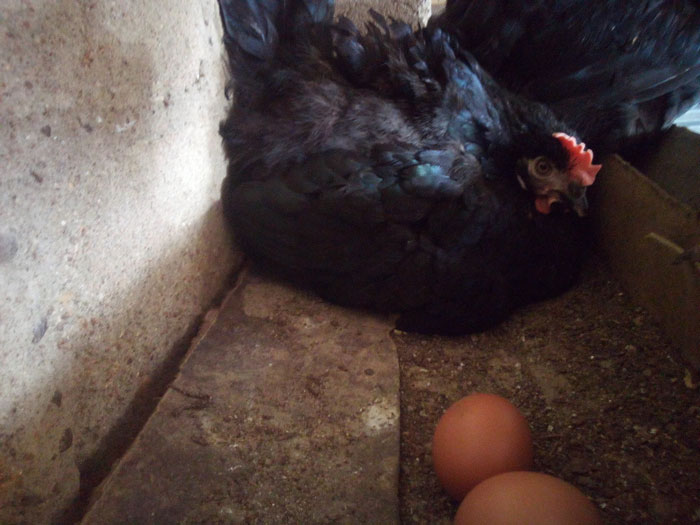How a Broody Hen Can Reduce Your Profit Margin
Your broody hens are capable of reducing your profit margin. Especially if your laying hens are kept solely for business and profit-making purposes.
When you notice a drop in egg production. It means a percentage or fraction of your laying hens have stopped laying eggs.
Read Also: Drop in egg production, 13 solid ways you can reduce it.
Always lying down to cover her eggs in an attempt to hatch the eggs, most times you have to force the bird to eat. Without any apparent evidence of disease. These can be attributed to broodiness.
This behavior can be very frustrating to both the farmer and the broody hen.
The simple fact is that the eggs can never be hatch because they are not fertilized eggs.
The farmer is left to battle with a drop in egg production which will adversely affect his profit margin. While the broody hen will continue to brood on the eggs for eternity except something is done.
Broodiness is the tendency or behavior of an egg-laying hen to sit or cover her eggs with the aim of hatching them.
This could be a wonderful experience for the chicken owner if your sole aim is to have baby chicks and watch them grow. Especially for backyard and small flock owners.

Broody Hen Are More Prevalent In Deep Litter System
Depending on the farming method you adopt, most medium scale layer farmers, and to some extent, large scale layer farmers use the deep litter system of egg production.
This is a system whereby birds are kept in a confined environment with a lot of cross ventilation (both inlet and outlet air).
Deep litter is a system of rearing poultry and other farm animals, based on the repeated spreading of straw or sawdust material in the poultry house.
With an initial layer of litter spread for the birds to use for bedding material and to defecate in, and as the litter is soiled, new layers of litter are continuously added by the farmer.
With an initial depth of 4 inches and the continual removal and topping of the litter until a depth of 6-12 inches is rich.
To form a good compost manure, which is suitable for both backyard farming and large scale organic farming for crop production.
You may like to READ: How to achieve optimal poultry production with good deep litter management practice

Why You Are In the Business of Egg Production
I am very sure as a farmer, you aim to have multiple streams of income. Also to create a means of lively hood for yourself and your family.
And to create jobs for those in your community. To achieve this feat you need to be proactive, and do everything humanly possible to achieve maximum profits.
To also block any loophole that may affect your profits margin.
A lot of poultry farmers don’t pay attention to this seemingly unserious problem that is silently affecting the economy of their farm.
And also considerable reducing the profits margin on their farm. The implication of having a broody hen in your flock. Is that, they will stop laying eggs at least within the period in which they become broody.
Of course, no farmer will be happy having a broody hen sitting on his unfertilized eggs trying to hatch them. While they have stopped laying eggs, this is not a good situation.
For you to have most of your flock laying eggs, and to restore the birds that are not laying eggs back to their normal state, for which you intended them to be.
Several very important factors have to be looked into:
Understanding the Root Cause of Having a Broody Hen
- Not picking eggs regularly from the nest Most birds kept in deep litter systems are provided with nest boxes to lay eggs. Unlike those reared in battery cages that their eggs drop, and are kept away from them.
- Birds kept in deep litter systems are provided with nest boxes. And are always in close contact with their eggs. Not picking your eggs regularly is a sure recipe for a broody hen.
- Chickens are social animals, the sight of seeing other broody hen sitting on their eggs inspires other hens to starts the behavior. The best way is to discourage your birds from becoming broody.
- When rearing chickens for the sole purpose of producing eggs for commercial purpose and profit-making. Care must be taken in selecting the type of breeds you raise. Some breed are more prone to become broodies than others.
- Birds such as Silkies, Austrolops and Cochins breeds are prone to broodiness than most other commercially inclined birds that are breed mainly for commercial egg production.
Identifying a Brooding Hen
- A Broody hen will always sit and clutch on eggs around her. Even when others will just lay an egg and leave especially the commercial breed that is designed to just lay eggs.
- They will always make aggressive noises each time you try to get close, touch or attempt to carry her. She will also puff out her feathers in an aggressive manner.
- In most cases, you may have to drive a broody hen away, for her to have her meal. I have experienced that on several occasions, I have to lift her with my hand. To remove her from her nesting position so she can eat or drink water.
- Most broody hen will usually prefer the dark corners of the nest, and will always remain there. Except on a few occasions when she will come out to feed or drink water.
Effect of Having a Broody Hen
- Broody hen stops laying eggs, and once they stop laying eggs it will affect the number of eggs produce on a daily bases. And once the number of eggs reduces your profit margin will in turn reduce.
- A Broody hen becomes lighter in weight when they are light their egg production suffers. The main reason you are in business is to have them lay as many eggs as possible.
- They will sometimes trample and subsequently break eggs if you don’t regularly pick them, thereby encouraging egg eating.
- Broody hen could easily be injured and pecked at. Resulting in injury that may lead to cannibalism among your flock. This may lead to death and a reduction in the number of birds in your flock.
You might be interested in READING: Why your laying hens are eating and breaking their eggs, and how to stop them

Farm fresh eggs, pick direct from the farm
How to Stop Your Laying Hen from Broodiness
- Picking eggs regularly from the nest. Most chicken farmers have this notion that the eggs have to be much before they pick it. This is not a good idea when it comes to layer farming, especially for profit.
- When you don’t pick eggs you are encouraging broodiness in your flock. And as the eggs accumulate there is the tendency for the chicken to break the eggs. The eggs could easily become dirty, the best way to go is to pick your eggs at regular interval.
- Identifying the broody hen, and then relocating her to a different cage. Where she will not have access to the eggs and smooth cushion. These will help in discouraging this behavior.
- The cage should be comfortable enough for the bird to lie down and stay. There should be enough space underneath so that cool air can reach the bird’s stomach. And in turn, make her lose her broodiness since the warmth in her body makes her broody too.
When to Restore a Broody Hen To the Initial Flock
From practical experience when you take a broody hen to a separate cage away from her nest and the litter she is used to. After some time she begins to lose her broodiness.
- You will notice that she will reduce the fluffing or puffing out of her feathers.
- That aggressive squawking sound will stop whenever you approach her.
- Most importantly, I make sure I see her lay the first egg before taking her back to the remaining flock.
- Once she lay her first egg, it is a clear indication that she has lost her broodiness. Because a broody hen stops laying eggs once the behavior starts.
READ: Why Duck Farming is a Good Alternative to Chicken Farming
Conclusion
Broodiness is a natural instinct and behavior found in birds, especially with laying hens kept on deep litter with the provision of a nesting box.
Having a broody hen among your flock is a common sight.
Allowing the number of broody hens in your flock to persist and increase in number is capable of affecting and reducing your profit margin in the long run.








I don’t think the title of your article matches the content lol. Just kidding, mainly because I had some doubts after reading the article.